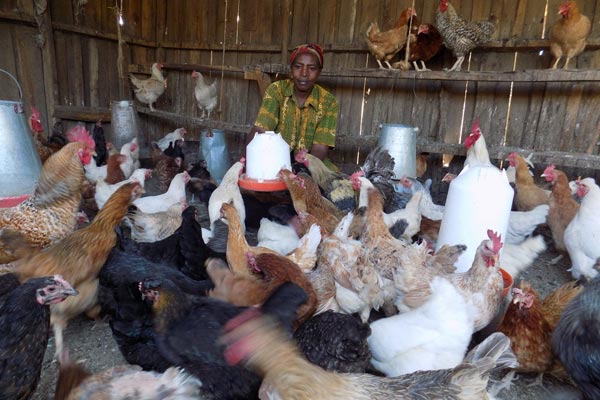Umoja 1 estate in Nakuru County is a few metres from Lanet Army Barracks. The proximity to the barracks has made residents scramble to live in the estate as they consider it one of the most secure.
It is mid-morning when this writer arrives in the middle-income suburb. The residential area is so quiet one can hear their own footsteps. The children who ran around playing in the evening or at the weekend are off to school, and so are many of their parents who have gone to work.
My knock on the gate of Mary Wairimu is greeted by sounds of chickens squawking and trilling, an indication that I had disturbed their peace.
Soon, Wairimu lets me into her 60 by 110ft plot where her poultry farm is located. “This is my office,” she says as she bends to arrange a carton box full of eggs in trays that she will deliver to a supermarket in Nakuru town as soon as we finish the interview.
“I have 300 kienyeji hens, 50 cockerels and about 100 chicks. They were all about 1,000 in December, but I have since sold many.” She keeps the birds in a wooden pen behind her three bedroom bungalow. “These birds have offered me a nice job that I just do from the house. It has been two years and so far, so good,” says Wairimu who started up with about 60 chicks.
Wairimu quit her job as a sales manager at a flour milling company after working for 10 years to concentrate on poultry farming. She had reared the birds as a side hustle for two years.
“I noticed that I was earning more from my chickens than from my job. I, therefore, thought that I should quit and put all my energy on poultry,” says Wairimu, whose initial investment was about Sh50,000, with over half of the money going to construction of the pens.
Prior to quitting, she had approached Naivas Supermarket, which offered her ready market for her eggs.
“I talked to the management of the outlet and they agreed to consider me as a supplier on condition that my products are of good quality.” When she delivered her first supply in early 2013, the management was happy with the quality of the eggs and gave her the go ahead.
“The quality control manager picked one of my eggs, broke it and liked the pale yellow yolk and the smooth shell. He did that on three others and allowed me to supply.” Her supply at the supermarket is capped at 100 trays per month.
“I am able to meet the target because I collect five trays of the fertilised eggs every day. I further sell 30 trays to a brooder in Pipeline, about 3km from my home and the rest to residents. Prices of a tray of 30 eggs range from between Sh450 and Sh600 or between Sh15 and Sh20 per egg.”
So what is her secret to getting quality eggs that have made her maintain two corporate clients?
“For the strong and smooth shells, I ensure the chickens get plenty of calcium by feeding them on omena (fish meal) and enough greens for the yellow yolks.” She has planted kikuyu grass, spinach and sukuma wiki (collard green) in her compound which her chickens feed on. They feed on the grass every day as they strut the compound.
Wairimu also feeds her chickens on kienyeji mash, maize germ and wheat bran. “I feed the birds on kienyeji mash in the morning and supplement with either pounded maize, wheat grains or omena in the afternoon.”
Besides eggs, Wairimu sells an average of 15 cocks a month at between Sh800 and Sh1,500 depending on their sizes. A day-old chick sells for Sh100, Sh200 for a month-old and Sh350 for a two months old. She sells up to 100 chicks a month.
“I do not use an incubator to hatch the eggs but let the hens hatch them naturally. I have made carton brooders where selected hens brood them. At any given time I have 10 to 15 hens sitting on eggs. Each hen sits on between 10 to 12 eggs. I spread old gunny bags in the cartons to increase the warmth,” says Wairimu, noting that 90 per cent of her eggs hatch successfully.
Back in 1999, Wairimu had tried her hand in keeping exotic layers, but this only lasted for about year due to high production costs and low income. Apart from selling eggs, chicks and cockerels, she also produces manure and cow feeds from chicken waste comprising of droppings and used poultry mash.
“I separate the waste from the manure using a sieve and sell part of it as cow feeds at Sh400 per bag while manure goes for Sh300,” says Wairimu, who gets two 90kg gunny bags of the cow feeds and three of manure every week, which she sells to a dairy farmer and vegetable farmer in the estate. She gets most of her clients through referrals.
Dr Ann Ambula, a livestock expert from Egerton University, says green matter helps to supply carotene to chickens, which is used in the formation of the yellow pigmentation in yolks. “Besides the yellow colour, eggs from hens fed with greens have more Vitamin A as the greens are rich in the nutrient,” says Dr Ambula.
She advises that poultry farmers should allow their chickens to walk in the compound to eat plants and collect insects and worms, which boosts their health and thus quality of eggs. Molo Livestock Officer Simon Mburu says chicken waste is rich in proteins that cows need.
He noted chickens do not exhaustively consume their feeds and thus, some of the nutrients are wasted after digestion. Nakuru County Poultry Farmers chairman Benson Anjimbi advises farmers to study market needs before poultry farming.








